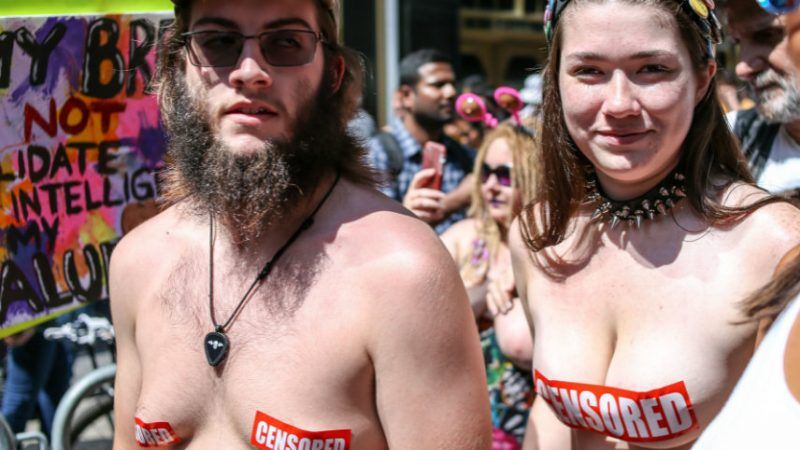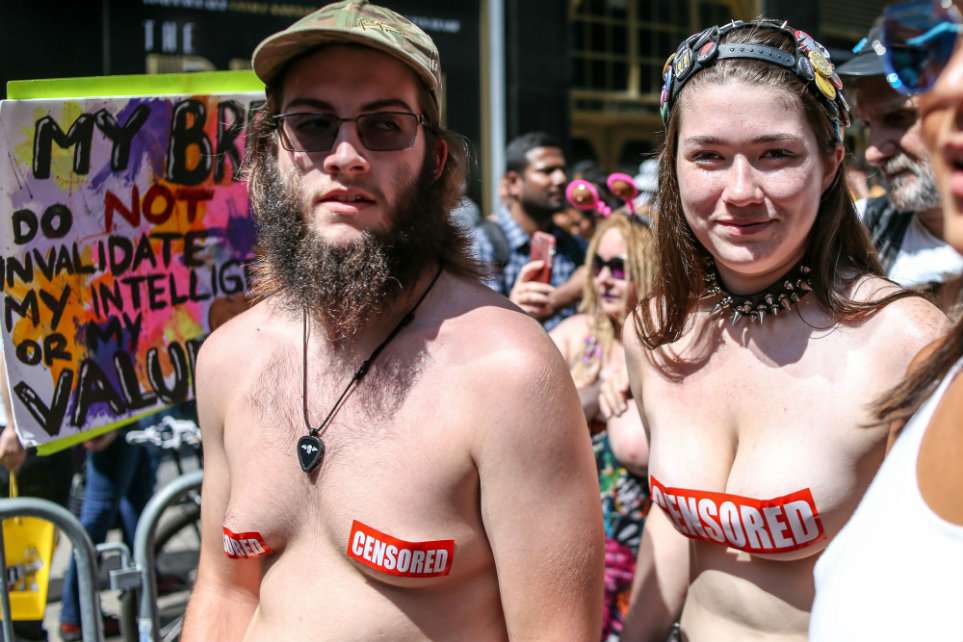Women's Boobs Are Not Free Speech, Says Federal Court
Because 'traditional moral norms' trump civil liberties


To protect public health, safety, and morals, the government has an important interest in preventing women from going topless, a federal appeals court has ruled. And the importance of keeping lady breasts out of public view overrules any First Amendment or equal protection issues that such a policy raises.
But at least one dissenting judge felt differently, describing our topless protagonist as having "engaged in the paradigm of First Amendment speech—a public protest on public land in which the participants sought to change a law that, on its face, treats women differently than men."
Going topless might not be inherently expressive, "but to declare, as a matter of law, that it can never be expressive is the quintessence of throwing out the free-expression baby with the non-expressive-conduct bath water," Judge Ilana Rovner wrote.
And while Rovner notes that as a citizen, she doesn't "relish the prospect of seeing bare-chested women in public," she thinks the plaintiff here does present "potentially viable First Amendment and sex discrimination claims."
The case (Tagami v. City of Chicago) stems from the 2014 ticketing of Sonoko Tagami, who took to the Chicago streets with only opaque body paint over her bare breasts to celebrate "GoTopless Day" that year. Tagami was issued a $100 citation for violating the city's ban on public indecency, which prohibits the public display of female breasts and of all bare butts and genitals. After losing her challenge to the citation, Tagami filed a lawsuit with the U.S. District Court for the Northern District of Illinois.
Tagami's suit argued that banning women from going topless in public while allowing men to do so is a violation of the 14th Amendment's Equal Protection Clause as well as her First Amendment rights. Neither the district nor appeals court agreed, dismissing Tagami's claims.
In a November 8 decision, the U.S. Court of Appeals for the 7th Circuit held 2–1 that the city's rules don't violate women's constitutional rights. "Chicago's public-nudity ordinance regulates conduct, not speech," wrote Judges Diane Sykes and Frank Easterbrook for the majority. And while "some forms of expressive conduct get First Amendment protection," this doesn't apply unless the conduct is inherently expressive.
Whatever Tagami's political intent in going topless, she did so while expressing her views about the issue in other ways at the same time. "The presence of additional explanatory speech 'is strong evidence that the conduct…is not so inherently expressive that it warrants [First Amendment] protection,'" wrote the judges, quoting a Supreme Court case about military recruitment on campus. And because it is not "overwhelmingly apparent" that a woman walking down the city streets bare-chested "expresses a political message," the act does not qualify for First Amendment protection, they ruled.
But isn't it? It's still illegal for women to go topless in most places across America. Sure, there are nonpolitical reasons why a woman might momentarily do so: breastfeeding, sunbathing, going wild at Mardi Gras, some sort of psychotic break or, worse, performance art. Yet to walk calmly topless down the street for an extended period of time, in the company of other topless women, soliciting nothing, seems pretty inherently expressive to me.
Had they not carried posters or shouted slogans, an army of bare-breasted women barreling down the street would probably get their intended message across, or at least get across the idea that it was a political statement of some sort.
Even so, when speech and nonspeech elements are combined to convey a political message, courts have held that prohibiting the nonspeech part is still cool so long as the prohibition is related to "an important or substantial government interest." In this case, the court agreed with Chicago that allowing shirtless men but not women in public was necessary to protect "health, safety, and traditional moral norms."
The judges cite a 1991 Supreme Court case that justified public nudity prohibitions because they are "of ancient origin" and "exist in at least 47 States." Similarly, they added, the Chicago law has "existed in one form or another for decades" and its relationship to "promoting traditional moral norms and public order" is "self-evident and important."
As for Tagami's equal-protection claim, Chicago argued that specifically prohibiting female but not male toplessness "does not actually classify by sex" since the reason more of women's bodies must be covered is "wholly attributable to the basic physiological differences between the sexes."
This is, of course, silly: Both men and women have breasts, and the only reason women's bare breasts are supposedly more endangering to public health, safety, and morals is because of cultural norms, not physiological ones. Still, the judges held that even if the city is wrong on the first part and the law really is a sex-based classification, it's an allowable one because it serves the "important government objectives" of preventing people from seeing women's breasts.
In her dissent, Judge Rovner pointed out that "the speech at issue here is that which offends many, makes many others uncomfortable, and may seem trivial and unimportant to most." But "the First Amendment protects not just the speech which a majority of people find persuasive and worthwhile," and "its protections are most essential when the speech is that with which most take offense. This is the caveat that must be emphasized beyond all else in this case."
In dismissing the case before it even got to court, the district court and majority here have "declared that there is no set of facts under which Sonoko Tagami's participation in an annual 'Go Topless Day' protest—an event sponsored by a 501(c)(3) group advocating for gender equality in indecency ordinances—could be viewed as expressive conduct," notes Rovner.
But contra their contention that "Tagami's public nudity did not itself communicate a message of political protest" and required additional speech, "the fact that Tagami included some explanation with her conduct does not necessitate a finding that her message would not have been understood otherwise. Accompanying explanations do not turn expressive conduct into non-expressive conduct," Rovner wrote.
She likened their legal reasoning to declaring that "wearing a black armband would constitute expressive conduct, but wearing an armband and shouting 'No more war!' would not" and suggested that we can't "evaluate the expressive content of public nudity divorced from the context" in which it takes place.
It is akin to taking a picture of a recent women's march protest and enlarging it again and again to isolate a single marcher wearing a pink hat and concluding from the picture of a single hat-wearing marcher alone that the conduct is not expressive because the wearing of a hat 'd[oes] not itself communicate a message of political protest.'
There could not be a clearer example of conduct as speech than the one here.
While going topless might not always be inherently expressive, it can be, the dissent continued. While not saying that the free-speech and equal-protection claims here would necessarily prevail in court, Rovner concluded that it was premature to dismiss them without "a full airing of the evidence"
A government can still ban conduct that is expressive, of course, if has an important and legitimate reason. Yet "while it is true that in our society female breasts have been sexualized as objects of desire while the breasts of men have not," there isn't a biological basis for the distinction, noted Rovner. The only functional difference in men's and women's breasts is that women have "the potential to provide milk to sustain a baby"—a purpose for which women are allowed to bare their breasts in public in Chicago.
Chicago's claim to be promoting "traditional moral norms and public order" here "boils down to a desire to perpetuate a stereotype that female breasts are primarily the objects of desire, and male breasts are not," the dissent continued, and we can't decide whether things pass constitutional muster based on stereotypes. "Any invocation of tradition and moral values in support of a law that facially discriminate among classes of people calls for a healthy dose of skepticism on our part, as historical norms are as likely to reflect longstanding class biases as they are reasonable distinctions. Whether out of reverence or fear of female breasts, Chicago's ordinance calls attention to and sexualizes the female form, and imposes a burden of public modesty on women alone."


Show Comments (203)